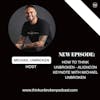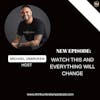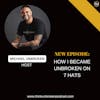From Trauma to Triumph | Life after Trafficking | with Shametria Gonzales
Join me on this extraordinary episode as we dive into the incredible life journey of our guest speaker, Shametria Gonzales... See show notes at: https://www.thinkunbrokenpodcast.com/from-trauma-to-triumph-life-after-trafficking-with-shametria-gonzales/#show-notes
Join me on this extraordinary episode as we dive into the incredible life journey of our guest speaker, Shametria Gonzales. From being trafficked and enduring extreme poverty, Shametria's transformation into a Founder, life coach, and real estate investor serves as an inspiring testament to the possibility of change.
Discover Shametria's bold mission to empower others and prove that achieving unimaginable goals and unlocking limitless potential is within reach. As her fans worldwide embrace her teachings, Shametria's mastery in guiding individuals towards success is unraveled.
🔔 Don't forget to subscribe and turn on notifications to receive future episodes packed with empowering stories and insights!
************* LINKS & RESOURCES *************
Learn how to heal and overcome childhood trauma, narcissistic abuse, ptsd, cptsd, higher ACE scores, anxiety, depression, and mental health issues and illness. Learn tools that therapists, trauma coaches, mindset leaders, neuroscientists, and researchers use to help people heal and recover from mental health problems. Discover real and practical advice and guidance for how to understand and overcome childhood trauma, abuse, and narc abuse mental trauma. Heal your body and mind, stop limiting beliefs, end self-sabotage, and become the HERO of your own story.
Join our FREE COMMUNITY as a member of the Unbroken Nation: https://www.thinkunbrokenacademy.com/share/AEGok414shubQSzq?utm_source=manual
Download the first three chapters of the Award-Winning Book Think Unbroken: Understanding and Overcoming Childhood Trauma: https://book.thinkunbroken.com/
Join the Think Unbroken Trauma Transformation Course: https://coaching.thinkunbroken.com/
@Michael Unbroken: https://www.instagram.com/michaelunbroken/
Follow us on TikTok: https://www.tiktok.com/@michaelunbroken
Learn more at https://www.thinkunbrokenpodcast.com
Learn more about Shametria Gonzales at: https://shametriagonzales.com/
Support this podcast at — https://redcircle.com/think-unbroken-with-michael-unbroken-childhood-trauma-cptsd-and/exclusive-content
Support the Podcast: Become a listed sponsor!
Follow me on Instagram @MichaelUnbroken
Learn more about coaching at https://coaching.thinkunbroken.com
Get your FREE copy of my #1 Best-Selling Book Think Unbroken: https://book.thinkunbroken.com/
Michael: What's up, Unbroken Nation! Hope that you're doing well wherever you are in the world today. I'm very excited to be back with you with another episode with my guest, Shametria Gonzalez. What's up, my friend? How are you today?
Shametria: I am doing good. I'm so grateful to be here.
Michael: Yeah, thanks for coming in. I appreciate you coming to hang out with me being this studio and have this conversation. We connected; I was judging one of Grant Cardone's speak offs during the 10X Growth conference here in Vegas in February, it was Valentine's Day. And you were competing with a few powerhouse speakers, a couple of which I know personally, and just in a couple of minutes, your story was powerful and captivating and I was like, this is someone I wanna sit down and talk to and have a conversation with, because what you do now is beautiful, but the path that you've led to get to where you are is one that I think warrants a deep conversation. And so, thank you so much for being here.
Shametria: Oh no, you're welcome. I appreciate it.
Michael: Yeah, for sure. So, let's start here. What's something that I need to know about your past to understand and know who you are today?
Shametria: So for myself, I would say, that I was a small town country girl with a really big dream, that meaning I had been through a lot of adversity, but a lot of what I did was an innocence. And so, I didn't know that I was born with crack in my system. I didn't know that I was poor or adopted or a foster child, I just knew I loved life and it was this thing inside of me that just allowed me to be who I was, and that was energetic, fun, smart, very outgoing and I love to talk, like people's favorite thing to tell me was like, Shametria shut up like during the movies, but that is what allows me to be who I am now, is that innocence and that love and that energy that I always had through all of my adversities, through everything I'd been through. I was born in the country, I played outside. I didn't wear shoes. I was very humble, but I also didn't know all the bad stuff that people put on me as I got older. So, I actually did have in my mind a pretty good upbringing. Although to other people, you know, when I tell my story, it's a bit much for them, sometimes I even have to tell them, you know, take a second to just take a deep breath cuz you might be triggered by some of the stuff that I've been through but I'm here for you. And it's a safe space for us to talk about this ‘cuz I don't tell everybody. So, when I have those conversations, I always lead with that because I know other people may not have that strength of what I have that have been, or maybe they never shared their story or maybe they don't know how to even accept their story. But I found out my story later down the line from other people. I always thought I was great.
Michael: Yeah. What comes to mind, and I don't think contextually it fits, but this is what comes to mind the idea that ignorance is bliss, right? And that the ignorance being the unknowing, not lack of education or intellect, but just not knowing something different and that played a big role in my life, like growing up, being in a super abusive home drug addict, alcoholic mother, absent father, abusive stepdad and me being like a drug addict when I'm 12 years old. I look at that and I'm like, well, I didn't know any better. Right. This is the ignorance of the society that I grew up in. And what was fascinating in my journey, I like, started to slowly unravel things. I was like, why is my life a disaster? And it's like, you look at the dominoes, you roll them backwards and you're like, well this is probably why. Growing up, mentioning it, being a small town. Do you feel like people were intentionally protecting you from what was happening?
Shametria: So I would say it was insidious, if that's the word for it. They were all protecting themselves, it was very drug addicted, very small country town. A lot of tickling and like touching, I always would dress myself as a boy, like, and try to look masculine and not pretty cuz every day I'm like, she's so pretty. I was a mixed breed girl as you, you know, I'm black and Spanish, but on one side I lived with all black people. And then on the other side I lived with all Spanish people, so I was the different person in each group so, I got a lot of attention. And because I was always living with different families and kind of here and there people, I never had that protection of a mother cub to like, or a mother to protect her cub to be like, don't do this or don't touch her like that or don't do, like, I just was free so it just didn't feel right a lot of the stuff that would happen to me. So, when I think of protection, I think the church protected me, I think the school protected me. I grew up in Texas; Texas has an amazing school system, they have an amazing social work system, they have an amazing system for, children, athletic wise I was an athlete too, so those systems protected me. My family and I love and adore them. My mom was in and outta my life, my dad tried to come and get me when he would be sober. Both of my parents were addicted to drugs as well, I was born with crack in my system. So from the womb, again, I didn't really know nothing was wrong with that, but I knew that I was different and that's, people would make jokes like she got, you know, that's why she got all that energy and I'm like, what are you talking about? Or my grandmother would say stuff like, you hot. Are you fast? And I'm like, I didn't know what that meant. But as I got older, I started to see that I was a beautiful young girl, I was curvaceous, I had long, pretty hair and that brought a lot of attention and with that type of attention, it actually shut me away from everybody and I would try to cover myself and be as small as possible. So that was actually harder for me than just to be me. But I did that cause I didn't feel protected. I felt like predators were all around me at all times, no matter what shelter, what house, what family side of the family ‘cuz if you're not there all the time, you're just a little girl like they don't have love for you, they don't know you so, that's kind of where that goes. But I definitely will say I appreciate the systems that were put in place in Texas that I emancipated myself at 15, you know, that's because my social worker told me how to get out the system because I did that I was trafficked, I know part of my stories that I was trafficked. And that's because after I emancipated myself, there was no more social workers looking after me. There was no more kind of going back and forth to, they would give us, they would basically the judge said I would have to have a job and provide for myself, that was it though. So if you can prove that you're grown legally in the court's eyes. So, I signed myself into school, got a job, and I started kind of speaking up a little bit more and that's when I got, you know, introduced to some women that brought me into the life of being trafficked. And that's when the drugs started, I'd never did drugs cause I saw what it did. I didn't want that for my life. I was a student athlete, but without anybody watching over me, everything that like spiraled out of control was because I did not have somebody to just care.
Michael: Yeah. We're going to go down that path a little bit deeper in a moment. I want to go to something that, and this is for me, kind of a personal journey that's been both simultaneously difficult, but like the very thing that's probably led me to where I am today and that's growing up biracial. And one of the things that people generally speaking, unless you grow up biracial, you don't understand is that you live in two different worlds. And so here, on one hand, I'm like growing up in the hood around, and very, like, really imagine, I mean, drugs, alcohol, gambling, stealing, hooking up the whole thing. And then on the other side, it's like, I've been called both black trash and white trash, which is a really weird thing. And so like, growing up biracial is an incredibly tumultuous experience, and this is for me, right? So, on one hand I have my grandmother who's white, and I've shared this many, many times on the podcast, was very racist. I wasn't even allowed to have black people in my house. And we had a copy of Hitler's autobiography, mine Comp in our Kitchen. Right. And that's comp my uncles in the area brotherhood, I mean, it just keeps going and going and going. So, I obviously had a massive identity crisis as a kid, that's why I started doing drugs when I was 12. What was growing up biracial like for you?
Shametria: I would say growing up biracial for me was a lot of names calling. Went back on one side of it, Blackie on the other side of it, the way they did it, I laughed at it because I didn't see that it was mean or deceitful, but I didn't know Spanish people could be racist against blacks. Now, I mean, for myself, we're the same like, I literally saw two different cultures. The white families that I was with, I was born like I said, with a lot of complications and I was dyslexic and I had all these problems, so I would get more checks than the other kids. So, I was always the kid who everybody wanted in context checks.So when you are awarded the state, a foster child, when you are a part of a system, you get paid by the state, whoever adopts you or takes you in, gets paid from the state for you. So, whatever they need to take care of you, they get food stamps, they get Medicaid for you, they get a check if you're sick, they get a check if you need extra care. hey get a check so it could be a money thing. But for someone like myself, once I realized that that was happening, that's why I emancipated myself I'm like, I could get my own checks or what, ‘cuz I had a social worker who I was explaining my story to and she was like, if they're not taking care of you, you're very smart, you're beautiful, you're talented, you're a great athlete, you're on student council, you can take care of yourself better than someone else just taking your money. So, when I say a check, that's, you know, kinda what I'm referring to. But for that reason, I don't think I experienced as much as hard of a life as other kids did. But I always felt over sexualized one ‘cuz you know, black and brown women are a little bit more curvier like, I'm a Texas girl, I was really voluptuous. And so, I felt that that was always something that was put in there. And then like back in the day, culturally, for those who don't understand the hi the black culture they would have songs like She's a Bad Yellow Bone, you know, Lil Wayne would say stuff like, yeah, I got a black girl, but she would look better red. So there was this like turmoil with black girls, it was like colorism back in the day, during slavery time when it was the brown paper bag Society. You know, if your skin is the color of a brown paper bag, you could be a part of this, but if not, you can't be in the house.
So, you had slaves that were outside slaves and then you had slaves that were inside slaves like, all of this stuff I learned as a grown woman, but I experienced as a child. I had no idea what it was until I was like, dang, that's why they felt like that about me. Or like, someone cut my hair like I was sitting in my chair at school and you know, they have the chairs that like you, they have like, it's like a hole in between it and like you sit down. So my hair would always hang out the back and like they would always tie my hair to the back of the chair. So I would like, I tried to like tuck my hair away, so then I would just like take it and put it over the chair and not behind the chair. And one of the girls, she was mean, she cut my hair and like, everybody laughed and she was like, your hair will grow back. I'm just like, like, what did I do to you? But it definitely was something that, oh man, I wouldn't want anybody to go through it. Especially not somebody who doesn't have thick skin or kind of play everything off and like laugh at it. But it was really hard for me, it was hard. I know people, you could say what they want, whatever, but it made me feel like I didn't belong anywhere and that's probably why when predators came to me and told me I could be a part of a family, I felt like I could belong.
Michael: Yeah, I get that a lot. I always felt, and probably even to this day where didn't fit in with the black kids ‘cuz I was too white, didn't fit in the white kids I'm too black, I identify as biracial, period. If anyone's like, you're black, you're white. I'm like, nope. I'm bucking biracial. I'm biracial, period. And I've gone to war with people on this. And it's like, no, no like even you go fill out these forms for government taxes what, like, biracial is not on there, it says other right and I'm like, okay, that's how I've always felt my whole life. I'm up to you. Right. One of the things that is near and dear to my heart is, just having this conversation for people who are biracial because as we continue to progress in society, there will just be more and more and more biracial, multiracial people and that is a really beautiful thing, but it is being, you know, the kind of the cornerstones of this experience, it's been a war like that's the thing. I try to convey to people is like, they don't understand unless they are biracial. What it's like to be ostracized over something you don't have control over at all, at least if you're, and I say this in jest, but I'm like, if you're a full breed, you don't know what this world. You don't know what it's like to wake up in the morning and have this massive identity crisis. When you were young and those moments, like that girl did is absolutely tremendously horrible. But I think about that, it's like we're easy targets. There's a lot of reasons why you're an easy target. Foster kid, adopted drug addict, alcoholic mother parents, being this person who is still striving so, you probably have a little bit of like nerdiness and overachiever to you and resonate with so many of those elements And so even though I'm six foot four, I'm 220, like I fought like hundreds of times in school being a target just because of the way that, being the poorest kid in the school is an easy target, especially at the poorest school. I mean, it's very evident. I'm wearing shoes from Goodwill when I'm like in 12th, you know, 10th grade. And so, I think about that and there's this element of resiliency and this is the one thing that probably has been the cornerstone that has projected me to where I am today. When we're young, we have no idea, you're just like, I'm just gonna survive this and then when you become older, it becomes this amazing, amazing tool if you're able to leverage it. But now here you are heading into 15 years old, you've made an incredibly difficult decision. At the same time, you're deciding to take control of your life at 15 years old, I'm getting kicked outta school for selling drugs. Right. And so what I'm curious about where did that decision come from for you? If you nuance it down, was there an experience, multiple experiences. I remember kids emancipating themselves, and I even researched it myself when I was like 16. And I was just like, I guess I didn't literally get it then. But what happened in your life where like, I'm actually gonna do this thing?
Shametria: Oh man. So, I mean, truthfully. So I was a part of student council, I was a part of volleyball, basketball track, I had won like a homecoming queen, cuz I think that was the year be after eighth grade. Eighth grade, I had won like homecoming queen so like eighth grade was the best year of my life. I felt like I could do anything, I felt like I was on top of the world and I've had one person who listened to me and she was my social worker at the school. And she motivated me, she told me to read books, she told me that I'm not tangential, that I'm important. And I didn't know what that word meant, but I looked it up and I'm like, oh, that means that I'm not just something that could be replaced like I am somebody like I'd never had somebody pour into me the way she did. And so she would put these ideas in my head of like, I could do it, you know, and I could be better and I could make this happen. So, I like to tell people all you need is one person, one person to care, one person to show you a route, one person to give you an idea, and it's based on you, but because of what that seed is that she planted, it changed my life and granted, mine was also a little motive, you know, it's not all peachy, creamy. It was kind of like, I'm gonna prove y'all wrong, you ain't get no more money off of me. So, I don't really show that side too much, but it was definitely when I was 15, it was kind of like, you know, like, watch kind of that cardy B, I'm gonna show you. So, all of those things really, that one person was really, who made it happen. But I'd also been a part of a very publicly humiliating, you know, statutory rape at 15, right before I decided to do all that and nobody believed me, but DNA proved me right? And it was five guys, and this was in a small, small country town, it was so small. All three country towns had to come together to make one high school. Cause my freshman year in high school, and it was five guys and we had went to this party and remember, like, nobody, I did what I wanted to do. I didn't have any, like, nobody watching over me. So I go to this party, I'm drinking, I'd never touched a drink my whole life. I used to see my uncle like pee on himself, like, cuz, and then he is like, oh, ‘cuz he's drunk. And I'm like, oh, I don't ever want that to happen, right? So there's power and being exposed to stuff that's the byproduct of something that's bad. But I decided to drink one thing led to another, they took me in a car, took me in the forest, did what they did, brought me back to the party, no clothes on, completely passed out. The girls washed me up. So, basically all of this happens, I never say a word, which is the very first time that I realized that I did have power. But someone else, like, I go to school the next day and we're all playing volleyball, and I start to have blood. So, I run out, I run into the locker room and I'm like, balling, I'm like, you know, like I needed to be stitched up, I was hurt really bad. And so, but I wasn't gonna say nothing because I wanted to go away, I'm like, I messed up again, my mind rationalized it as everybody thinks this of me already. Now I'm proving them, right? Like, I gotta keep, I gotta bury this.
The girl runs in that washed me off and she's like, I knew this was gonna happen, are you okay? They raped you, they brought you back to my house, yelling, everybody runs in the locker room, she's crying,all the girls are like, what happened? Some of the girls, it's their boyfriend, two of them. So, they wanna fight me cuz they think I'm like, so there's something that a school teacher has to do, which is called being a mandated reporter. One of my coach has to tell the principal, my principal has to tell the nurse, the nurse has to call the police, the police have to call my foster parents, which at the time was one of my grandmother's, who had took me in. And that right their kind of like, I gotta get out this town, I gotta get away from everybody and I'm ruined. But I appreciate them now that I look back for being a mandated reporter, because they got me the proper medical attention that I needed I had to get 26 stitches. I still sometimes wake up and think that somebody's on top of me, I have these vivid dreams where it's like, I'm sleep, but I wake up and I can't get up. And it's like somebody's on top of me and the only thing I could do is like go back to sleep and it happens every now and then. But, you know, that stemmed all of my disbelief in myself and also my belief in myself. So, it made me feel like, one, I have to run away from this small town, I messed up their life and I don't know how to fix that because they got persecuted prosecuted the woman who threw the house party went to jail for over a year. The girls were prosecuted for washing me off. I mean, everybody told the truth except the guys, but DNA was found so that case really set me up and I don't think I've ever told that story publicly but that's literally as I'm thinking through in honesty, you know, just sharing with you that case is what prompted everything for me to get away and to prove everybody wrong and to change my life and to be in control. So the fact that I went and met these women that I trusted, ‘cuz it was women, I didn't trust men, but I thought I could trust women, that's what catapulted me into trafficking. And when it happened and started, I'm like, my body's ruined anyways like, nobody cares.
Michael: One of the things that like really hits home for me and what you're saying is and that's just such a tremendously painful experience. And you think about those moments and the commonality of it all. And something I have shared publicly, I was like, I was molested as a child. And you see this happen again and again and again. And in communities like ours and families like ours and schools like ours and it's like, but why? And then you go, okay, well this is both a generational and genetic and an energetic experience that precedes us. Like it goes back thousands of years and you're just like, okay, well sometimes, and this is a real f*cked up way to phrase it, I think about this a lot and go like, it's the inevitability of the experience of the life of the people who grow up, how we grow up. It's so unbelievably common that I use the word inevitability. And it's heartbreaking because you're sitting here and you're like, okay, well, you know, we then learn to not trust, we learn to not love, we put up these big barriers for many of us, and I include myself in this to cope with it, it's drugs, it's alcohol, it's sex, it's gambling, it's addiction, it's driving 150 miles an hour on the highway, it's doing all these crazy, crazy things. And yet still there's this element for some of us where you come out the other side of it with resilience but that takes a long time. It's so much work to get there. And so now you're in this position where you've made a decision, you're going to emancipate yourself, you luckily, if you go look at resilience research it always points to this concept of there's one person who supports you, the chances of you finding success exponential versus some of these kids who have no one. And so, even one counselor, I mean, that's a big deal and I always point to, you know, one of my teachers, Mester Hollingsworth, who still listens to the show sometimes. He's the cornerstone cuz he sat down with me one day, he goes, you're not supposed to be here. Right. And he just saw something in me, when I didn't and that was a really, really big deal. And so now here you are, you're facing a reality that is almost impossible to make tangible ‘cuz there's no way that you don't become dissociated from something like there's no way, I mean, I'm not you obviously but the thing that I think about is the autonomic response that our bodies have to, that amount of stress is for you to disappear, it's how you cope, was this a part of the experience for you?
Shametria: Yes. I knew that the small I looked at the people around me, everybody in that small town, either you go to college, you make it out, or you work at a local place. I feel like if I wouldn't have went through that, I would have been one of those girls who would've stayed there and kind of went into the same trajectory of what I saw other people doing because I didn't experience anything else. But when that happened to me, I knew I had to run far away because one, I didn't wanna be associated with that story, that I didn't want people to know that about me. And then I also didn't wanna be hurt, I didn't wanna die like I really thought that they would fight me or try to hurt, like these were division one-a state champions that had already went to college and came back for homecoming, four of them lost their scholarship ‘cuz of decisions they made. But that little 15-year-old girl thought it was because of decisions that I made. So, I felt like I messed up everybody's life, I felt like I was the worst thing that happen to that town. And if I could left it, then that they would be better without me and that I could go and I could reinvent myself, that's what I did. So, when I say reinvent my story, like after that, they're like, I'm Shametria, you know, before they called me naname, that was my nickname cuz my middle name's Janae. So I changed my name. I'm like, I'm gonna use my birth name Shametria Gonzalez, I'm gonna emancipate myself now I'm legally grown. I'm gonna get a job, Sonic Drive-ins right across the street from my school. I'm gonna go to Sonic and get a job. I'm gonna sign myself into school. What school? I don't know. I'm gonna pick a school based on where I could get it stay in a shelter or somewhere. So, like I got a bus ticket to Dallas and that was it.
Michael: How far away was Dallas from that town?
Shametria: So this was this small town called Garwood, Texas, and it's like 45 minutes outside of Houston, so honestly, to me, like Dallas was like the big city, you know? Right. Houston was still too close so, Dallas was the next big thing in Texas. So, I and my sister also went to UNT, I forgot that part so I felt like I would have some support there. So, I have an older sister, my mom got pregnant at 11. She had her at 12. And my older sister has a PhD. She's married, she has three kids, a husband, same family lineage like that's big for us that never happens. No one else that I know in my family has one father of their children is married, educated, and went through adversity like she did. So, in a way I was kind of following in her footsteps, but she tried to take me in for a little while and then she kicked me out. I was troubled and I didn't, I was hurt and I did not know how to cope with that. I was angry and like, she didn't know how to deal with it, she was in college, she was at UNT.
So, when she put me out, I was homeless and I worked across the street at my school at the Sonic Drive-in, and I would go to school early during the day because we had athletics first period, which is like 6:45 I worked till like 12:30, 1 o'clock in the morning. So I made a way, you know, the person who owned it, sometimes he would let me sleep in the back like this was a struggle for a while. And then eventually I got up on my feet and I saved enough money to get a roommate and to stay with somebody. I think it was like back in the day was Craigslist. So, you know, it was before the pad splits and Airbnbs not like, it was like you meet people on the internet on Craigslist and they can rent out a room in their apartment, you know? So, that's what I did. And I mean, it was okay and then, like I said, at 15, you know, the question you initially asked me was like, I think it was without that I wouldn't have had a hard enough why to be able to wanna supersede and over exceed and prove everybody wrong. But then that also catapulted me into this way of still seeking, you know, suffering from abandonment, suffering from rejection, suffering from survivor's remorse. I survived this tragic, you know, situation and now I'm here and like all these other women that have been assaulted, have, like, it was all this stuff in my head. So, these women started coming up to me, and this is where I say, remember the first time I trusted a woman, she was my counselor, she was my social worker, she gave me good advice. So, it led the way for me still seeking some type of help, but moving and letting go of everybody I knew I was vulnerable. And these women would come every day, like, you know, they would come in a nice car, they would be like, you know, how much money you making up here, girl? And I'm like, like a hundred dollars a day for a 15-year-old going to on 16, that was good. And I still was in school, no pass, no play. So, I played sports, so I had to pass my grades. I didn't care about school, I didn't care about education, but I felt being a part of a team made me have some type of validity, it made me feel important. And I was always a talker and very outgoing and there why wasn't my why, my why was I gotta get to college. I gotta, that's all I knew I was a country girl. So go to college, get a scholarship, play a sport, change your life, you know, get a job. That's all I knew. So I was kind of living that, I was doing good for a while, a couple months. And these women, they kept coming and they were always in a nice car and finally she was like, you know, you need to come with us because we know your situation like you can't sleeping in somebody's house and here and there, like you need to focus on school. So, I was like, that makes sense to me and then I didn't really, I remember I was good with my independence, so then she said, you need family, you need somebody to love you, you need protection. That got me.
Michael: Yeah. There's a thought I just had, there is a huge amount of trafficking that happens in America that people have no idea about. It's absolutely insane, I had a conversation with Tim Ballard privately recently, cuz Think Unbroken, we donate money to Operation Underground Railroad which helps traffic children around the world and when you look at the statistics, it's shocking how often that happens right here in America. And the grooming comes in these situations, low-income children, children who are in foster care, being adopted, broken out, buck and sonic, drive through, sleeping in the back, you know, you're a perfect target for these people. And the grooming that they play is what you're about to get into is this thing about family, is about community, is about, Hey, you're gonna make money and we'll take care of you not recognizing that the opposite is literally about to happen. And I think that one of the things that is so devastating about the society that we live in is that that feels like the out for so many people because they don't know that there are other possibilities. So, these women are coming up to you. First, I guess my first question like, how do they know that this is your situation? I'm assuming they've befriended you, you're having conversations, they're starting to maybe do nice gestures for you like what was the framework of this starting to transpire?
Shametria: So I talk a lot and it's my gift now because I get paid to do it, but back then it was like my curse and so I didn't open up. But when I do, I tell everything and I tell the truth, I speak from spirit. So like I don't remember anything I've said today. I'm just speaking from my heart. I'm just speaking, you know, with my intention to get people's attention, to spread awareness by using my story on other young girls who are going through what I've been going through. Right. So back then, same intention. I have these women coming up to me and they didn't know at first, they just were like, first of all, they saw me there every day like what student works every day. I worked like seven days a week, honestly and some days I would work and just do like my boss relationships. He was a very good man, his name was Justin, I wish I could find him and just hug him ‘cuz he did a lot for me. But sometimes as a child, you know, you can't work over a specific number of hours. So I would work off the clock for free just to get my tips. I would just run the food just to get tips. So, cuz I didn't wanna be on the clock getting paid and then he gets in trouble. But I worked every day so that was the first thing. The second thing was I think that now that I understand energy, there is a light in me and there's a light in certain individuals like myself that attracts everything, it's the happiness, it's the bubble like I was on rollerblades, like, I was always really happy. I didn't carry depression with me. I didn't care. So, it wasn't even that they saw that, it was when I opened my mouth and I started to, ‘cuz like this is over a course of months, that's why I want people to understand, and I'm a young girl, I'm barely getting by, but I'm pretty good at what I'm doing, I found a system that works, but these girls were pulling up in Rolls Royce's, Maseratis, Lamborghinis, this is not a I'm thinking that they're millionaires, that they're made it in life and they took an interest in me and they wanna help me to get there. But it was all a facade. And so, once they, of course they would ask me certain questions and that's why I say, be careful, I talked to my daughter. Be careful of the questions that people ask you because people ask you stuff to pull stuff out of you, that's actually a great, you know, session like if we're doing a podcast or if I'm mentoring you or coaching you, I need you to pull it out of you because you know that's what you need to do. But some people are predators and they're just looking for prey. And one thing you say will trigger them and now once they're locked on you, they're locked. And I saw this happen over and over and over after I got into the space. He recruits, it's a train the trainer model. It's a recruitment model where girls go out, all those girls did was recruit for him. And they would go to schools when school got let out and post up, they would go to jobs that were close to schools cuz they know little girls stay there, they had an adoption attorney that now I know these things now that I'm older because I could play back in my light in my head that's what, that was. A private doctor that came to the house brothels people that owned hotels, rent, like they knew owners. So like, this was a huge operation and I rarely, rarely saw anybody but white and Asian men, a couple Indians, it wasn't a black ran operation. So I don't know how to explain that to people, because all culturally they see black as kind of like pimping, it's in music that men can pimp women. And like, that's not what this was a system that operated like a business. He told me, he said, so basically, not to go too far into it, but I'll get back to the business part of it and how the operation was ran once I got inside of it. But the grooming, they groomed me for months, they would give me a hundred dollars, a hundred dollars tip like I'm thinking, I'm like, I'm making money.
So, I'm like, first of all, now I'm trusting you because you're giving me money. Second thing was, there were women the thing that got me, I told you, they tell like, you need to be part of our family, they didn't tell me nothing like I never, and then I didn't think to ask the questions. So, that's what got me and then once I met Snake, his name is Snake, that should be the first time, he looked like your complexion, maybe he was from Dominican Republic, Cuba, I don't know where he was from, but he was beautiful and he had beautiful hair and he was very soft spoken, he wasn't mean, he wasn't vicious, like those things would trigger me, you know? He was, it's like a father figure in my brain at that time, and he would kind of like talk to me. He talked to me one time and he did, you know, have sex with me one time, never again and he did that with every girl. I didn't know that at the time, but I thought I was special and then he was gone. So to me, he explained the rules, like, me and you sitting down right here, I come in. He was like, how you doing, beautiful? I was like, I'm good like, I was really shy. So, you know, I was like, I'm good, I just thank you so much for, you know, giving me an opportunity to come and be a part of what you guys do here. I've been on my own for so long, I always wanted a father figure, I just, I'm so grateful for you that was what I said to him before I knew anything, that's what I thought till I was 27 years old. But long story short, he takes me in the room, candles, like does stuff to me at a 15-year-old, I never had happen to me, he does everything and I'm just like blown away. And we lay in bed and he tells me the rules. He is like, so this is how I go, you know? And he called me addiction. He said that I had an addictive personality, like a addicting, you know, like a thing that, like if you see me once that you know, wanna say something or he said a second chance beauty that was addictive. Like that was what his words were to me. So, we're laying in bed and he's like telling me the rules he's like, look baby girl, you don't have to do nothing, you don't wanna do lie. But you have to do what you gotta do to make sure that the family is taken care of cuz we are family.
So, I'm like, okay, like what I gotta do. He was like, you young, you got a certain type. He was like, so basically you go and you just waitress. You go to poker matches. He said, I got a lot of rich friends, you just gotta take care of them. I'm like, okay, poker. I waitress, I give out drinks. First couple months, that's what I did has a team meeting, a hundred plus women. I don't think people really understand how big this is, he had a multi-million-dollar mansion. He had cars everywhere, drivers, house moms, which a house mom is somebody who, she don't do none of the work, but she's older probably something's wrong with her. I don't know how she becomes that, but like, that's what I thought. I would retire as a house mom ‘cause I could take care of the women like that was my brain. He said, all of y'all are independent contractors say it with me. Independent contractors. Independent contractors. So, Y'all work based off contracts, y'all rich, all y'all wealthy. So, I mean, in my bro, I'm like, but we never got a dime, I never touched a penny of the money. My fee per night was $2,500, every night. One man is a thousand to 1500, maybe 2,500. If he's a high roller. This ain't no pedal. Nickel and dime on the strip, walking 40 dollar, this is like the highest of the highs that are coming to deal with us, and it's very exclusive. Everybody's name was John. Everybody's name was John. No matter who they were, our name was the name that was given us to in the house. My name was Addiction. That started off with going poker and stuff like that was cool then he said that meeting, he's like, y'all are independent contractors. And he was like, we got this new drug. We about to go level up now. He said, everybody, you know, you take it, talk to the doctor, he gonna give it to you and help you forget cuz now we about to be making big money, I'm like, okay, cool. I don't gotta remember it anyways, so that's when he started taking us to these brothels.
We go in a room, it's like, look like a sauna like from what I can remember, it was like a maybe a massage sauna in the front. But in the back would be these rooms they give you a pill, go you, whatever happened, you wake up, go home, shower, do your thing, do it again the next day. First it was like for me, I went to school. My thing was as long as I could go to school and I could play sports, I'm good. So now I'm about 16, so 15, it was around summertime when I joined, so my birthdays in July, so I had turned 16. So, from 16 to 17, I'll say it was kind of more so the waitressing and he introduced the Molly and like it was Molly now that I know what that drug is now. But he introduced that to us and we started going into the rooms. It started affecting my grades and it started affecting me being able to play sports. So,I beg him, I'm like, please, I'll do anything, I can't take that no more. So then I was doing it sober, so now I'm more conscious of what's going on and it don't feel right, but I'm doing it for my sisters ‘cuz if one of us come up short, I always made the most money. So, I always was giving out money. I felt valuable in what I could give because I'm part of the family. Yeah.
Michael: And that's the whole trick, right? That's the whole game. And I think that's the thing people don't understand is like, you, you see this, so I had Nick Nanton on the broadcast. Nick is a documentary filmmaker. He's an incredible human being and he was the documentary filmmaker for Operation Truant, which is about saving these child prostitutes in Haiti. This is the same conversation, like, whether it's here in the States or globally, always these people, these children who are in the world alone, feeling like they have family now. And you know, obviously I think we can go into the depths and the crux of this, but there's something, the reason why I wanted and gave you the space to explain that, cause I want people to understand like, this was happening while in high school in one of the biggest major metropolis is in one of the biggest major metropolis is, all of America, millions and millions of dollars are being trafficked through this, through young girls every single day and you're trying to figure out how to live. And making no money off of this thing that's being, you've got, I mean, I'm sure you've got politicians, celebrities, athletes, people who are famous walking in and outta these rooms, and you're walking away with nothing. And so, I wanna fast forward a little bit to the transition because I think this is really important and a lot of it will tie into the other side of the story and what you do now. What was the catalyst for you pulling yourself out of this? What did that look like? And what were some of the first steps that you took to really getting your sovereignty after this?
Shametria: Step one, my best friend overdosed. I had stopped taking the drugs. She kept taking them. She didn't wanna remember, she didn't go to school. She was 13 at the time. Her name was Sina Buns, and I bunked with her. So, she came home, she was like, my head hurt. I'm not feeling good. So we go to sleep. I wake up, I'm like, sine buns get up. I'm about to go to school I'm shaking her, she never wakes up. So I call the house mom, I'm like, something wrong with sine buns. She's like, go to school, we're gonna take care of it. I never saw Sine Buns again. Strike one. I didn't care about myself, but I cared about her. She was young. She came in when she was 10 years old. She, it was like year three. I was like 17. I was kind of over it. But I knew I had already finished high school, I didn't graduate, but I had finished, I took my ACT, I finished all my courses, you know, 12th grade, you really just go to go in some high schools, especially if you did all your credits that you needed. So, I just was over it, he was telling me that I was gonna be the next porn star.
So, I thought that that was gonna be my life. So I was like, done with school, didn't really care about myself, but I cared about Sine Buns. So when I saw that happen to her for the first time in my head I was like, that could have been me. Nobody would've known where I was at. None of my family, like at that time I had a baby. I had a baby as well when I was 17 from being trafficked. I didn't know who the father was, but I kept her. And thank God that there was a woman I know her name's Cynthia and her son liked me, so we had been kind of courting, but I couldn't really have a normal life doing that. So, she took my baby in so like, I'm there and I'm kinda like, that was the strike too, is like, now I have a child from this like, how am I gonna tell her this? My best friend dies. I don't know where she's at and nobody will tell me anything. Matter of fact, that's the first time that snakes slapped me and put me in the dungeon ‘cuz you know, they had like basements. We called 'em the dungeon, but they had basements. I didn't have no food for three days because I was asking the girls what happened and he said that I was being messy that was kind of strike cuz he had never hit me that was my thing like at triggered me. So now I'm like, okay, you hit me, I got a child from this, which means that you're not even making sure these being protect themselves if I'm not conscious that's what I thought. I'm like, you couldn't even make sure they protect themselves. Right. And then three was like, I remember going to school, and somebody was like, you look tired, they would always tell me I looked tired ‘cuz I never liked to look at myself like that. I always thought I was so beautiful. Remember I was beautiful, I was radiant, I had energy. So, I'm like, damn, I don't know who I am anymore. And so there was a pastor of a church who came in and infiltrated our system, that was what got me out of it. But those three things, leading up to that is what made me talk. Same way I got in it is the same way I got out of it. I opened my mouth ‘cause remember we never supposed to talk, but I was fed up. He came in and he never, I liked him. His name was Coach. I'm gonna say coach, just to be safe cuz he's recently passed. But you know, everybody knows, who knows me knows but he would come in and he wouldn't make me do the stuff that I had to do for other people, if that makes sense. He wasn't innocent, although he infiltrated it. I gotta be real about that too, cuz I don't lie. Now when it comes to this, I used to protect him and then God was like, you have to tell the truth cuz he was a minister and like, it was also, I was vulnerable too, but he didn't make me do everything. So, I just did stuff that wasn't, you know, like just dancing and he would do little stuff to me, but he never penetrated me. So, I thought I trusted him, I felt like he was, he had good intention. He would always ask me these questions and I felt like he was like five. Oh. So, I was like, but then what he did with me made me trust him ‘cuz if you police, you ain't about to do this and keep coming back doing this with me. So that's why he did it. So you know, I say that both sides ‘cuz if he wouldn't have did that, I wouldn't have trusted him and I would've told on him, he probably would've got killed. I'm just being real. So, he comes in and nothing I had, you know, ever told him before, gave him enough ammo to take back to the FBI to be able to infiltrate our system except Sine Buns. Like I broke down to him and I'm like, they won't tell me where she at, I know they kill her, I know they don't have her no more, like this ain't right, I don't even wanna be in this no more. But I'm, I'm branded, like I have this huge snake on my arm and all of the girls have it. And so, I've been trying to talk to a couple of the girls and find them because we don't know each other's names. I don't know they birthdays. I just, if I see they face, that's why I'm out so much putting my face out there, telling my story. I need them to come into me. I need to know that at least some of 'em are okay, and I could be there as support, that's why I got home for grace. Right. So anyways, back to the transition. The pastor comes in, I tell him everything, I break down, I tell him the truth, I'm like, I don't have a penny to my name. I was like, I've never made a dime. I said, all he do is take my money and make me do this every night. I said, and I have to help other girls. So now I'm doing two, three bodies a night, that's like 6,000, $10,000 sometimes. And I was a good talker, so people would give me more, but they're not giving it to me, they're giving it to him and he telling them that he's taking care of me, but they know what's going on so they really don't even care. But after talking, you know, just like me and you talking right now, I had people that was my client for three years. It wasn't just always boom, boom, leave actually, I really feel in my heart, deep down in the most weird way, ‘cuz I was a child, that they cared and some stopped coming and that's how I knew they probably cared. But I tell the pastor what happens? I hear, boom, boom, boom, boom, boom, they bust down the door, everybody get on the floor. This part is always hard for me to tell because I was the informant. I didn't get a prostitution charge. Every other girl that was legally of age got a prostitution charge, they took their operational ring down as a prostitution house, as a brothel versus a corporate business that was evade and taxes, that was literally violating women, drugging us up, allowing men to come in and do stuff with us to make a profit, they blamed the women. And they hated me for that. They felt like, cuz eventually everything came out, everything unraveled Snake was never to be found. So after all that, he's still probably outrun operations, I'm not afraid of him anymore. He's a monster in my story. And if he ever were to see me or do something, then I've died spreading the truth. Right. Not to manifest that on myself, but that's how hard I would go for this, because you cannot get up here and say that and know the person who was over you, that you looked up to as a God is still out there without being okay with the consequences. So, I broke the operation, I talked too much.
Michael: You know, it's funny because there you just said Monster. I've mentioned this many times on the show, but there's a horror film that I love, that I watched when I was a kid and effectively they said, when you talk about your nightmares, they lose power over you. And that's so much of the reason why I created this show and have put the space in for people to not only talk about like the practical things and how we change our lives, but like the real truth and the darkness. Right? Because this level of vulnerability and I mean, look here's what I think about a lot like there are things that I know with certainty will change people's lives and that's why we do this and it's not easy, right? Having these conversations, sharing the truth, it's like people wanna hide from this, they wanna hide from the reality, they want to pretend we live in a world that we don't live in and I'm like, that's not true. We live in this reality, not the one that you f*cking wish we lived in. I go look at at my childhood and all the drugs I did all the times running with guns and hurting people and getting shot at by the cops and getting put in handcuffs and all the chaos that I was a part of, I was like, that was reality. And even like, you know, you said something about this made me think, there was something in me that I know one day, like I'm probably gonna cross paths with someone I did something really horrible to when I was a kid or vice versa. I recognize that comes with this territory but I've also accepted it because I know that even though that's a possibility, I believe because of the energy I put into the world, it's less of a possibility than it probably ever could be because of who I am. And I think that, I always reference The Alchemist, the universe is always conspiring in your favorite.
Shametria: It's my favorite book.
Michael: Yeah. Mine too. My favorite fiction book anyway. And so for me, I look at, and I hold space for these conversations knowing that there's one irrevocable truth, and that is that the truth sets you free. And so even though it's difficult, and I know that we probably had people tune out halfway through this cause it's so heavy. I'm like, we're gonna have the conversation anyway. Because it's in that, having that conversation that we get to change the world. Now I look at transitions as being the cornerstone to success or failure, it's everything. And I tell people this all the time when I'm coaching, I'm like, if you're weary about making decisions about your life, when you're scared and you're uncertain, that's the best time to do it. And so, when my life changed forever after losing a million dollars and being 50,000 bucks in debt, 350 pounds, smoking two packs a day, like massive, massive rock bottom, it was in the transition 13 years ago that led to this moment, I can connect the dots I did this thing that led to this thing right led to this. Cardone investing in Think Unbroken which led to you speaking on that stage and me seeing it and being here, but it was the decisions that we make that lead down the pathway. So, you're out, you're changing your life, you have a child, you're on this path, you're doing something different. I would have to say, and I'm gonna, this is probably conjecture cuz obviously, I don't know but I'm going to assume that you had an identity crisis. I want to know how you became who you are today?
Shametria: Yeah. So, after that bust happened, I realized like, wait, I made it through this, I don't have anything that wasn't curable. My child was healthy, I don't have a prostitution, I've never been in trouble one day in my life for nothing I did. Oh, I'm blessed. I'm about to tell I'm about to guy. You ain't gotta tell me nothing else. I believe I thank you like that was an epiphany because no matter what I got myself into, no matter what other people tried to do to me, that was something on me that covered me and I believe was the Holy Spirit. You know, I'm a Christian woman, but I went to church a lot like a lot of the programs were churches that helped me, got me school clothes, got me, helped our family for Christmas, helped like churches. So, I kind of grew up in that so after that happened, the guy who rescued me the coach had a church called God's Academy and he says, look, all that stuff, he talking about that porn star ‘cause I was like, look, I'm gonna do it for myself like I still had a little bit, it's all I knew. So, I'm like, I'm gonna just do it for myself cuz you know, he was like, you'll never do that again. God got you like he helped you, he saved you for a reason. He was like, look, I need you, your story is powerful. I need you to write your story to every college, that's a HBCU. I'm like, what is that? He was like, it's a Historically Black College University, and they specialize in having fun it and helping people like you. I'm like, okay. He was like, don't you, you play sports, right? You played sports? I'm like, yeah, I played volleyball and basketball. He was like, write every athletic director. Tell him your story. Tell him you'll come in red shirt the first year so you can get your high. I didn't even have a high school diploma, but I got a scholarship, which people would think it's funny, but I'm like, I shared my story, I wrote my story, copied and paste, emailed it to the athletic directors. Of course, he did it for me, I just shared the story. He signed me up for FAFSA and he was like, look, you go to college, it's the same situation they pay for you to be there, free room and board, and you get to learn, you get to be a part of a team. So I'm like, cool. I wrote my story, 28 scholarship offers came in over the course of the next couple months. I picked Southern University at New Orleans because they allowed me to come with my daughter and having a one-bedroom apartment, they provided security, which was an off-guard security that was kind of like, it was like campus security, but he would all, you know, he knew to look out for me and Avery in case somebody Snake, you know, in case somebody wanted to hurt me or something, I brought down, this was not a small operation, this was huge. So, keep moving forward now my why is I got an opportunity full scholarship then I find out, because I was adopted and awarded the state and all this stuff and trafficked, they had scholarships for me that I get the money, I already got full academic scholarship and full athletic scholarship to pay for housing in school. So now I'm starting to get some money, I didn't have money. So now I get to like, I actually have thousands of dollars coming in from scholarship and I'm like, people care about me and I get another chance at a new identity. So now I'm not addiction and I'm not nana, I'm fully Shametria for the first time I get to step into that woman that you see today and I just never stopped.
So, from college, my why was that I got saved other people that Sine Buns didn't make it out, it was something driving me. And then my coach the second year did something that completely, if I didn't have enough that pushed me over the limit, she let go of everybody that was there because grades, attitudes, it is the HBCU number of black people. She said two people get to stay me and the captain support, which is her sister. My coach had played in the Olympics, but she only came back to coach her sister. She went to UCLa. She had two degrees and was working on her masters while like at 25, this woman was my source of who I could be. And she said, I'm going to get rid of everybody that's local and I'm gonna get international students to come because they're gonna make you better, they come here on a visa, a school visa. If they don't pass or play, they got home, some of their parents have worked their whole life to send one student to college, they're gonna push y'all to be better. And I played, so she brought in somebody from Russia, Libya, Syria, China and for the first time she brought the culture to the school, it wasn't just about being at the HBCU, it was about us being at an interracial about us being in a space to where we could experience this biracial, this inter international group of women that all had a drive, that's all she cared about was the drive, that's why she kept me ‘cuz I was bad my freshman year like I wasn't the best student athlete and I was still kind of broken. So, but she didn't give up on me and she brought other people that would make us even better. And when I heard their stories about being bombed, the only student that I tell you about, 12 brothers and sisters, she was like the middle, they envied her cuz she was the smartest. So they sent her to college and everybody else worked like I heard these stories and I realized that that was another push. Then junior year my coach come up to me, she like, you gonna be team captain me? She said, and you gonna be NAIA all first conference and first district. She was like, and now you have curfew and we gonna, and you need to have your daughter. She makes you a better student athlete. Cause I let my daughter go back and say with the lady Cynthia again, I did those things. I lost 35 pounds all conference, exceptional captain I even quit basketball. I was like, look, I'm just focusing on volleyball because we got something here. She got new coach of the year and then after that just to, you know, kind of catapulted, that's what created the woman that you see today, character wise was the woman that I played on that team with was the transition of me getting out and finally being a part of something that really did matter.
Michael: And that's the same family that you were seeking. Right. And I think about this all the time, I look at you, you know, you walked in the studio, you saw the photo of me and Tom. Tom Bilyeu. And, you know, over here, I haven't put them up yet, but there's photos of me and other incredible people who are, they're like my family. Right. There are people who have ushered me into where I am. There are people who support me, who push me, who tell me about possibility. You know, who inspire me to want to be able to become whoever I can become and it's such a reminder that, I mean, you know, there's something you have to reconcile about your experience in that it's the past and you have to let go of this. And even there's a level of like, you have to forgive yourself, you have to have the willingness to do different things and live in a different capacity. And if you're willing to do so, you'll find that again, the universe conspiring in your favor puts these opportunities in front of you. And it's like you have to take advantage of them and you have every reason in the world. You know what's, why I wanted to have you on as like, I sit and I think about all the time, the people who make a tremendous number of excuses for why their lives suck and it's not that you're not allowed to. You're allowed to be the victim. I'm not taking that from anybody like, you're more than welcome show up, be the victim, watch your life, continue to suck. And it's like, if you're just willing to do whatever it takes, your life will be different. And that's the whole game. I mean, statistically, people like you and I are not supposed to be here. I look at my life, my three childhood best friends have been murdered, I don't have a high school diploma or a college education, I've been able to do some really incredible things in my life. And it's just been, because I made a decision at 25, I was like, I'm not gonna negotiate with myself anymore, I'm not gonna play the victim anymore. I'm not going to allow people to integrate their beliefs onto me and I realize it's so much about how I think feel, act, do, believe that leads to the place of success, of being able to seek my full potential and prosperity through showing up every single day. And it's not that it's easy. I mean, it's not nothing about my life is ever simple. I mean, it's a consummate battle of every day waking up and making the right choices, not doing drugs, not hooking up with strangers, not gambling, not driving a hundred maybe sometimes. But I'm just generally speaking not doing these things that drive us into destruction. but then instead into creation. And I think that one of the things that you've done really beautifully is now what you're creating through your message and through the businesses and I want you to take a few minutes to talk about that.
Shametria: Yeah. So after college, I found my gift. One of the things I said on at Growth Conference this year was the easiest thing I ever had to do was get on a stage. The hardest thing I ever had to do was believe I deserved it. So I say, your gift will make room for you and I think I got that from like TD Jakes or Steve Harvey or somebody. But when I thought about it, my voice saved me. My voice created an avenue for me to speak and make money and then it also allowed me to build the relationships that got me, the business opportunities that I have today. My story and my voice, which is my gift.
So, after college, I became a community organizer, got into politics. I started learning more about city council, actually put myself on the ballot for city council. And when I realized that politics is mean and gruesome and they pull up your dirt and they were even trying to like question if my high school diploma was real versus my college diploma, I like, I was just like over it. So, I didn't run, I backed out, but I will run again but I'll be ready. And at that point I hadn't fully stepped into my story and didn't, I kind of was going off my accolades because you can get somewhere and forget who you are. So, I was kind of like, okay, I got a degree now I'm people know me, I got a boyfriend, like I have a son with a baby that I know the man that was the big deal for me. I know it seems like I was proud of that, like, ‘cuz it had been so hard growing up. So going to advocay work, doing a lot of speaking, raising, I was a good fundraiser, so I would share my story and I would raise millions of do, I'm not joking, like millions of dollars. And so I remember as an organizer, I was making like $45,000 a year. My rent was like 3,200. My car note was like 800 like there was no way I could make it helping other people. But remember my value was in what I could do for others. So, I'm like, you know what, I'm not doing this anymore like I'm not about to be speaking for free, I'm not gonna be a peer just raising money for, I'm gonna start my own not-for-profit ‘cuz I know where the money's gonna go and it's my story because they're not giving me nothing, not a penny. So, the straw that kind of catapulted that, I was at the Zurich Classic with an organization that's franchised throughout the world, I was their spokesperson. We raised over $800,000. I go home, there's an eviction note on my door. I call the not-for-profit and I'm like, Hey guys, you know, I know we just raised all that money like, I really need help for my rent. I got my babies, my baby daddy in jail at the time. Son's father went to jail and I'm like, this is real. You know, I'm still kind of, I'm on the path, but stuff still keep happening called life. And they were like Shametria, I'm sorry, the funds cannot be allocated towards housing. The funds, you could allocate my story in front of thousands of rich people that don't reflect me and make me feel a certain way, retraumatize me and you can't give me $3,200 that I'll pay you back. I just don't get paid for another week and they have an eviction note with three days, they said no. So, at that moment, how I got a pattern now I'm starting to see myself. I thrive in that I got you, I'm gonna open my own not-for-profit. Matter of fact, I'm gonna help other women that are survivors to advocate and use their voice so they can get paid for what they fundraise 10% ‘cuz if it wasn't for them and their story, matter of fact, especially women who've been trafficked, everything has been taken from them. Don't take their story. So, I started advocate and I started, created my first company was called Forward, that's called Focus on Real Women and Real Dreams. And it was sponsored by Dress for Success Worldwide, I won first place out of a hundred women in the country. So that catapulted me to the next level, I created Unleashed to speak ‘cuz I'm like, you know what? I can help entrepreneurs to use their story to be able to share on an entrepreneurial level, to be able to connect with their audience, because there's power in your story. And I know I'm a great storyteller, but I also can help survivors. One, there's a retreat that I host called Unleashed so, I take survivors and mentors, and I pair the mentors pay for it, the survivors don't, and they come and the mentors help the survivors. I don't, so, we do train the trainer with a mentor, of course, but then they help the survivor and they sit there with them as they go through reiki, air acupuncture, massage, storytelling, life mapping, there's counselors there. So again, it's just creating stuff that I didn't have that I felt other people needed and then I was like, well, wait. A not-for-profit is not for-profit. I mean, I could pay myself a salary, but I'm still not making money. So I was like, I see Grant Cardone talk about you can make money with real estate. So, I don't need a license so I start wholesaling, I'm like, I learned a wholesaling game and I do pretty well in that and then I'm like, well, all my money's going back to marketing with this and it's hard. So, what can I do? Let me get my license, that was the game changer. I got my license. I met Sophia Willett who was, I think I met her at like one of the 10X stages workshop with Pete Vargas is, cause I was still, another thing, I started investing into myself before I did anything, those refund checks went to conferences. There was a guy named Ty Lopez. He said one quote that changed my life. He said, if you want to be rich, go where rich people are and that's conferences. And I was like, oh, $2,800 refund check Lisa Nichols and he said, go VIP so I always went VIP which is one of the things with Grant Cardone and Pete Vargas the reason I even got to be seen as much as I did by the people who were judging and that were doing this, and to hear my story over and over is because I paid for Pat Quinn's signature talk. I paid for Pete Vargas 10X Stages, I went and went to Growth Conference, you know, and I was a part the virtual stuff with Grant Cardone, but I really didn't understand until everything came together that all of those years of paying and reading and books and conferences and trainings got me to be able to be the business owner that I am today. And then getting the licensing, which is being actually equipped with the tools to do the deals is what gets me my commission checks, and then being able to advocate for other women, because I don't want anybody to be used like I was. I want them to know the power of their story. I want them to understand that there is so much power in standing up for yourself and being able to negotiate that you can do that, especially even if you're a survivor you have nothing to your name. You have your story. And specifically for women who have been trafficked, other survivors, I get it. But women who have been trafficked, they never got paid for what they did. So, helping them and advocating when I was a organizer, 13 laws got changed over the course of those years, that is what I'm most proud of because I use my story to advocate at the local, federal, and state level to be able to change legislator's heart. So, that's another part of what I do so that's kind of my world of like what I do. I'm sell real estate, but I specialize in multifamily cuz of my mentor. She knew a way to get properties and she would tell me if you do a transaction with a residential person that's once in a lifetime. But if you do a transaction with a multifamily broker or investor, they're gonna come back and they're gonna come back. So, and then, building relationships and that I'd already worked on personal development. So it really was this array of just work do and investing that thing.
Michael: And that's what it always is showing up for yourself when you have nothing, when you're dead broke. I mean, I invested in my first training when I was 50 grand in debt and I was like, great, it can't get worse than this, so what the hell? And you know, it's interesting too, I didn't even file bankruptcy. I got myself out of it. And it's like you have decisions to make. And I'm not saying it's easy. I mean, the car got repoed. I was dead broke. I was borrowed, I literally borrowed money to go to therapy and it was like, whatever it takes. I mean, there's a post on Facebook from like eight years ago where I was like, can somebody gimme 150 bucks? I need to go to therapy today. Right. And now it's like, well now I've coached thousands of people around the world, this is big podcast, blah, blah, blah. But it was like, make the hard decisions. Be willing to be vulnerable, ask for help, show up for yourself. Put your last dollar on the line because if you've already been at your worst, like you know what it's like to go there, you might as well go forward. Your story, your journey is incredible. And I thank you for sharing it and my hope is from this, people just find some inspiration to understand that like, it doesn't matter, this is what I always am trying to convey. It doesn't matter what you come from for two reasons. One, nobody cares and I'm not trying to be an asshole. But two and more importantly, it doesn't matter because you can still create the life that you want to have, not saying you don't have to do the work and go to therapy and get a coach and read the books and go to personal development and go to the conferences, do the podcast and yoga and journal and meditate and show up and eat well, and don't do drugs and don't get drunk every single night, do all the thing. I'm not saying you don't have to do all I have to do all that. I'm just saying it doesn't have to be your story and that's so much of this. Before I ask you the last question where can everyone find you?
Shametria: Yeah. So everything that I do is branded under Shametria Gonzales. I love who that woman has become. I love who I'm becoming as I continue to grow and rather it's podcast, my Website, all of my endeavors shametriagonzales.com if you're interested in anything that I do with the women, we do have a house for women who have been sexually trafficked. We house them. It's called Home for Grace, it's located in Arizona. Can't say the location, but any volunteers, anybody you know, want to learn more about that? It's homeforgrace.org or shametriagonzales.com and that's where I play at those two areas is everything for me.
Michael: Yeah, guys, and go to thinkunbrokenpodcast.com. Look up Shametria episode. We will have this in the show notes plus more. So head over to thinkunbrokenpodcast.com My last question for you, my friend, what does it mean to you to be unbroken?
Shametria: To be unbroken to me is it's not how you start, but it's how you finish and then to say that my finish line is gonna always be my start line. So if I am broken, that means I've been I'm finished for the moment, but I can start again. I think that analogy just it's what comes to my heart, I started off very, very tragically and hard and I was just recently watching Anna Nicole's story, and it was so untypical of an American story because it didn't end well. And that's not how we end stories in American, just movies, whatever. And I realized in that moment, like, wow, I'm writing my story and I get to be the person who takes the pin and directs how it's gonna end by the choices that I make. So, if I'm ever broke or if I'm ever broken down or break down and it happens, I just remember, it's not how I start, it's how I finish. And every time that I start over again or every time I get to the finish line, it's a new start, something else gonna come. So be on your Ps and Qs and you know, you can make it just, you have to keep going and don't let your past get you it. It's starts in your mind. So to just be conscious of that.
Michael: Beautifully said my friend. Thank you so much for being here. Unbroken Nation. Thank you for listening. Please like, subscribe, comment, share, tell a friend. And remember, when you share this, you're helping us end generational trauma, turn breakdowns to breakthroughs, transform trauma, and to triumph and help people become the hero of their own story.
And Until Next Time.
My Friends, Be Unbroken.
I'll See You.
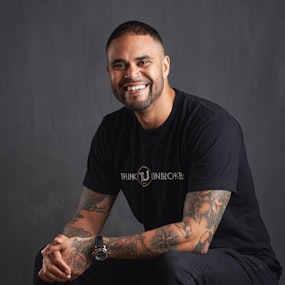
Michael Unbroken
Coach
Michael is an entrepreneur, best-selling author, speaker, coach, and advocate for adult survivors of childhood trauma.
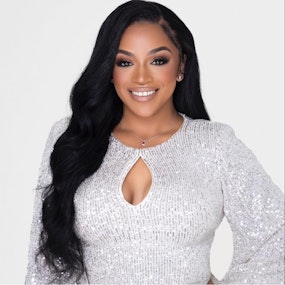
Shametria Gonzales
Founder
Shametria’s extraordinary story of transforming her life from being trafficked, and escaping extreme poverty to being a Founder, life coach, and real estate investor is the inspiration behind her bold mission to teach others that it is possible to do the same.
Today, fans worldwide revere Shametria for her mastery of teaching people how to accomplish unfathomable goals and tap into their limitless potential. Shametria has spoken on stages like the Zurich Classic, Dress for Success Worldwide Conference, and Grant Cardone 10x Growth Conference – just to name a few. Shametria has committed her life to providing women that have been trafficked with Homes for Grace and Unleashing people to speak all around the world.
Welcome to The Think Unbroken Podcast!
Here are some of my favorite recent guests!



























